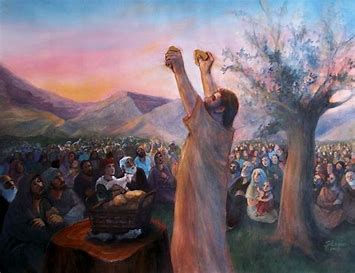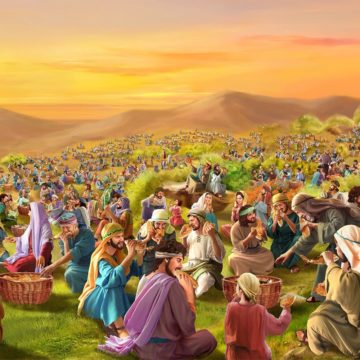On the Seventeenth Sunday of Ordinary Time we contemplate John’s Gospel account of the feeding of the multitude. Fr. Paul Gallagher, OFM offers a Scriptural Reflection. This content is edited by Franciscan Sister of Christian Charity Sister Anne Marie Lom and Joe Thiel. The excerpts from the Sunday readings are prepared by Joe Thiel. To read or download the complete pdf with excerpts for your prayer, please click here: Franciscan Gospel Reflection July 25 2021. Excerpts are from the Lectionary for Mass for Use in the Dioceses of the United States of America, second typical edition © 2001, 1998, 1997, 1986, 1970 Confraternity of Christian Doctrine, Inc., Washington, DC. Used with permission. All rights reserved. No portion of this text may be reproduced by any means without permission in writing from the copyright owner. Image: (25) Pinterest
John 6:1-15
After this, Jesus went across the Sea of Galilee. A large crowd followed him, because they saw the signs he was performing on the sick. Jesus went up on the mountain, and there he sat down with his disciples. The Jewish feast of Passover was near.
When Jesus raised his eyes and saw that a large crowd was coming to him, he said to Philip, “Where can we buy enough food for them to eat?” He said this to test him, because he himself knew what he was going to do. Philip answered him, “Two hundred days’ wages worth of food would not be enough for each of them to have a little bit.” One of his disciples, Andrew, the brother of Simon Peter, said to him, “There is a boy here who has five barley loaves and two fish; but what good are these for so many?”
Jesus said, “Have the people recline.” Now there was a great deal of grass in that place. So the men reclined, about five thousand in number. Then Jesus took the loaves, gave thanks, and distributed them to those who were reclining, and also as much of the fish as they wanted. When they had had their fill, he said to his disciples, “Gather the fragments left over, so that nothing will be wasted.” So they collected them, and filled twelve wicker baskets with fragments from the five barley loaves that had been more than they could eat. When the people saw the sign he had done, they said, “This is truly the Prophet, the one who is to come into the world.” Since Jesus knew that they were going to come and carry him off to make him king, he withdrew again to the mountain alone.
Background:
During the present lectionary cycle the focus is usually on the Gospel of Mark. For six weeks the gospel texts have come from the 4th, 5th, and 6th chapters of Mark, highlighting Jesus’ ministry and teaching in Galilee. Last Sunday’s gospel recorded the return of the twelve from the missionary efforts that Jesus had sent them on. But the crowd that was attracted by their return was so great that Jesus invited the twelve to come away to a deserted place. But the crowd pursued them, arriving before they disembarked from their boats. In Mark’s gospel, this leads to his narrative of the feeding of the crowd (Mark 6:34-44). However, the lectionary, instead of using Mark’s description of the feeding of the multitude, turns to the 6th chapter of John’s gospel and John’s description of the feeding of the multitude. (The next five Sundays, the lectionary will continue to use the gospel of John and reflect on the mystery of Jesus as the Bread of Life.)
In the opening verse of the gospel, John states that a large crowd had followed Jesus because they had seen the signs he had performed. John does not comment about their faith or the fact that the people were hungry. The impression is that they were following after Jesus hoping to witness some miraculous event, or even be the recipients of one.
Jesus for his part sees the crowd approaching and seems to test his disciples, asking Philip about where they could obtain bread for such a group. Philip responds that not even two hundred days’ wages could buy enough bread to feed such a group. Philip’s brother Andrew volunteers that there is a boy with five barley loaves and two fish, but adds “what is that for so many.” Jesus’ dialogue with the disciples helps to emphasize the miraculous nature of what is about to take place.
Within the gospels it is very unusual that Jesus would perform a miracle in the absence of an expressed need, or in the absence of an expression of faith. That absence points more to Jesus’s motive for this feeding. While reading back into the motives of Jesus is always somewhat difficult, a hint may be found in the strong similarity to the Eucharist. Jesus takes the bread and the fish, gives thanks, and distributes them to be eaten. Twelve baskets of fragments are collected. When the people see the sign that has been done, they realize that the time of fulfilment has arrived. But Jesus withdraws to the mountains alone. John’s focus is clearly on Jesus as the one who brings in the reign of God.
Reflection Questions:
- Have you ever been part of a large gathering of people at a religious event? What do you remember about the mood of crowd? How were you affected by being part of the crowd?
- How do you respond to the needs of those who experience natural disasters?
- Do you ever feel like Jesus is asking you questions but already knows what He intends to do?
- Imagine that you are that child with the barley loaves and two small fish, and you hear Andrew tell Jesus about your loaves and fish. What thoughts would be going through you?
- Can you also imagine that you are one of the disciples who has just been instructed to give the people as much as they want? What would you be thinking as you turned to begin to distribute the food to the crowd?
- Imagine you are helping to gather up the leftovers. What would be some of the things going through you as pick up all the bits and pieces of food left behind?
- Which part of this text seems to touch you? Can you take some time to talk to God about whatever it is that has touched you in this gospel?




